Reading Challenge 2023: A Year of Books

The year 2023 is going to be overall a good reading year. A reading challenge is an exciting activity that encourages people to read several books or books that fit specific criteria. Exploring new genres, authors, and writing styles and achieving reading goals is fun. A reading challenge can work in various ways, depending on the specific challenge and the organizer.
Here are some common features of reading challenges:
Challenge criteria: The challenge has some criteria that readers must meet to complete. For example, you must read several books within a set timeframe, a specific genre, or written by authors from certain countries.
Tracking: Readers need to keep track of the books they have read and whether they meet the challenge criteria. It can be done through a physical notebook, an online spreadsheet, or a mobile app.
Community: Some reading challenges have a community aspect, where participants can connect with others who are also participating in the challenge. For example, social media or in-person events.
Rewards: Some reading challenges, such as a certificate or a prize, may offer rewards for completing the challenge.
Flexibility: Reading challenges can be as flexible or strict as the participants desire. Some challenges have very specific criteria and timelines, while others are more open-ended and allow participants to set goals.
Overall, a reading challenge is a fun and flexible way to encourage reading and set reading goals. By joining a reading challenge, readers can discover new books, and authors, track their progress, connect with others, and gain a sense of accomplishment upon completing the challenge.
Reading can be challenging for various reasons:
Decoding and Comprehension: Some readers struggle with decoding words and understanding their meaning.
Vocabulary: Readers who encounter unfamiliar words may struggle to understand what they are reading, leading to confusion.
Attention and Focus: Reading requires concentration and focus, which can be challenging for some people, especially those with attention deficit hyperactivity disorder (ADHD) or other attention-related difficulties.
Language barriers: For readers who are not fluent in the language they are reading, the vocabulary and sentence structure can pose a significant challenge.
Visual or Learning Disabilities: Individuals with visual or learning disabilities may experience challenges related to the text’s format or the material’s presentation.
Motivation: Reading can be challenging due to a lack of interest or motivation to read.
Speed: Some may find reading challenging because they read at a slower pace, making it difficult to keep up with assignments and large amounts of information.
Reading Challenge List
A reading challenge list can be a fun and rewarding way to challenge yourself to read more and discover new books and authors. They can help you become more knowledgeable and enrich your life in countless ways.
Reading challenges that you can consider:
Goodreads Reading Challenge: Goodreads is a popular reading challenge that encourages readers to set a goal for the number of books they want to read in a year. Participants can track their progress on the Goodreads website or app.
World Challenge: This challenge encourages readers to explore books from different countries and cultures and read books by authors worldwide.
A-to-Z Reading Challenge: This challenge requires readers to read books with titles that start with every ”letter” of the alphabet.
Classic Literature Challenge: This challenge helps readers to explore classic literature from different time periods and cultures, such as Shakespearean plays or American literature classics.
Diversity Reading Challenge: This challenge promotes diversity in literature by requiring readers to read books by authors from different cultural backgrounds or featuring diverse characters and perspectives.
Reading Bingo Challenge: Bingo provides a card with different prompts to inspire readers to explore different genres and themes, such as “a book with a one-word title” or “a book published in the last year.”
Popsugar Reading Challenge: An annual reading challenge that encourages readers to diversify their reading selections and explore new genres. The challenge consists of prompts or categories, each representing a specific type of book to read.
Modern Mrs. Darcy Reading Challenge: This challenge provides a list of prompts that encourage readers to read books in various genres and themes. For example: “a book you’ve been meaning to read” or “a book recommended by a librarian.”
Kindle Reading Challenge: The Kindle Reading Challenge offers personalized reading recommendations based on your reading history and preferences. The Kindle app makes it easy to access many books and reading materials. The challenge can provide motivation and inspiration to keep reading and exploring new genres.
Rory Gilmore Reading Challenge: The Rory Gilmore Reading Challenge is a list of books. The challenge consists of 339 books covering various genres and periods.
These are a few examples of the different types of reading available challenges.
Reading Challenge 2023: A Year of Adventure Through Books
Join the Reading Challenge and explore new genres, prompts, and tropes as you read through the year. The Reading Challenge 2023 is the perfect way to discover new authors, worlds, and ideas.
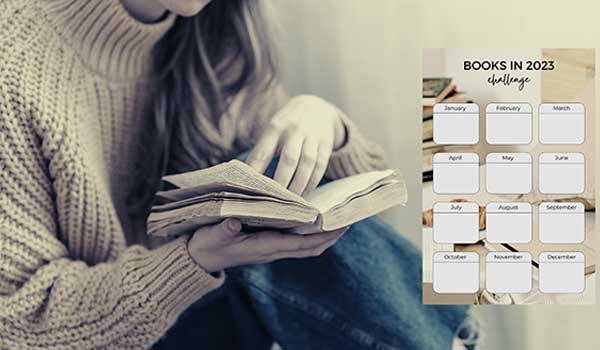
This year’s challenge is divided into four quarters, each with its own prompts and genres. Here’s what you can expect:
Quarter 1: January – March
The Reading Challenge’s first quarter is about starting the year with some diverse reading. This quarter’s genres are:
- Memoir or autobiography.
- Mystery or thriller.
- Historical fiction.
- Fantasy.
Prompts:
- A book with a one-word title.
- A book that takes place in a country you’ve never visited.
- A book that has been adapted into a movie or TV show.
- A book with a color in the title.
Tropes to look out for:
- A character with a secret past.
- A love triangle.
- A twist ending.
- An unreliable narrator.
Quarter 2: April – June
The second quarter of the Reading Challenge is all about exploring new ideas and perspectives. This quarter’s genres are:
- Romance.
- Non-fiction.
- Science fiction.
- Horror.
Prompts:
- A person of color wrote a book (Black/White/Mixed).
- A book with food or drink on the cover.
- A book recommended by a friend or family member.
- A book with a number in the title.
Tropes:
- Enemies-to-lovers.
- Time travel.
- A haunted house.
- A monster or creature feature.
Quarter 3: July – September
The Reading Challenge’s third quarter is about pushing boundaries and stepping out of your comfort zone. This quarter’s genres are:
- Poetry or plays.
- Dystopian or post-apocalyptic.
- Classic literature.
- LGBTQ+ fiction or non-fiction.
Prompts:
- A book published before you were born.
- A book with an animal/flower on the cover.
- A book with a title that is a question.
- A book that has won an award.
Tropes:
- A coming of age story.
- A dystopian society.
- A forbidden love.
- A tragic ending.
Quarter 4: October – December
The fourth and final quarter of the Reading Challenge is all about wrapping up the year with some holiday cheer. This quarter’s genres are:
- Contemporary fiction.
- Travel or adventure.
- Young adult or middle grade.
- Historical non-fiction.
Prompts:
- A book set during the holidays.
- A book with a magical element.
- A book with a character who is a writer/author.
- A book set in a place you’ve always wanted to visit.
Tropes:
- A small-town romance.
- A hero’s journey.
- A quest/adventure.
- A true story of survival.
30 days reading challenge
A 30-day challenge focuses on a goal for a period of 30 days. The idea behind the challenge is to create a habit by consistently engaging in a daily task for a month.
The challenge can be customized to fit your specific goal, interest, or skill level. For example, if you want to improve your fitness, you can commit to exercising every day for 30 days. If you want to improve your writing skills, you can commit to writing 500 words daily for 30 days.
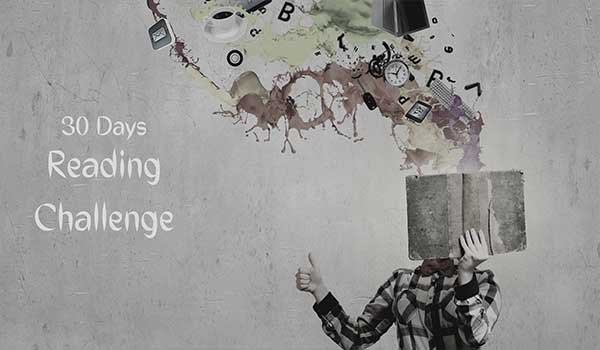
To get started with a 30-day challenge, follow these rules:
- Identify your goal or interest.
- Create a specific and measurable task you will commit to doing every day for the next 30 days.
- Set up a plan to hold yourself accountable and track your progress using a journal, app, or social media platform.
During the 30-day challenge, staying motivated and committed to the task is essential. It can involve seeking support from friends or online communities, celebrating small wins, and reminding yourself of the benefits of completing the challenge.
At the end of the 30 days, measure your progress toward your goal. If you achieved your goal, celebrate your success and consider continuing the habit beyond the 30 days. If you fell short of your plan, identify what went wrong and use that insight to adjust your approach for future challenges.
Here are 30 days of reading challenge ideas:
- Your favorite author wrote a book.
- A book recommended by a friend or family member.
- A classic novel that you’ve never read before.
- A book from a genre you don’t typically read.
- A book that’s been on your to-read list for a long time.
- A book that’s been adapted into a movie or TV show.
- A book that was published in the year you were born.
- A book with a protagonist that has a different background or experience from your own.
- A book that’s been translated into English.
- A book set in a location you’ve never been to.
- A book by an author from a different country.
- A book that won a major literary award.
- A non-fiction book about a topic you’re interested in.
- A book that’s been banned or challenged.
- A memoir by someone you admire.
- A book that’s part of a series.
- A book about a culture that’s unfamiliar to you.
- A book that explores a problematic or taboo topic.
- A book that’s been on the New York Times Bestseller list.
- A book that’s written in verse.
- A book that’s been turned into a play.
- A book that takes place during a specific historical period.
- A book by a debut author.
- A book that’s been recommended by a book club or online community.
- A book that’s set in your hometown or state.
- A book that’s been recommended by a celebrity.
- A book that’s been on your bookshelf for years.
- A book that has a unique or unusual format.
- A book that’s been adapted into a graphic novel.
- A book that’s been recommended by a bookstore or librarian.
I hope these ideas inspire you to create your own 30-day reading challenge!
Genre:
Fantasy: The Name of the Wind by Patrick Rothfuss.
Science Fiction: Dune by Frank Herbert.
Historical Fiction: The Nightingale by Kristin Hannah.
Mystery: The Silent Patient by Alex Michaelides.
Romance: The Wedding Date by Jasmine Guillory.
Thriller: Gone Girl by Gillian Flynn.
Horror: The Haunting of Hill House by Shirley Jackson.
Young Adult: The Fault in Our Stars by John Green.
Memoir: Educated by Tara Westover.
Biography: Leonardo da Vinci by Walter Isaacson.
Goodreads Reading Challenge 2023
I would love to read 100 books as far as genre. Generally, 50% of my reading combines fantasy and sci-fi. Last year, my main genre was non-fiction. In 2023, I want to try to find some favorites in the mystery-thriller section because I’ve mentioned it multiple times in the last couple of years.
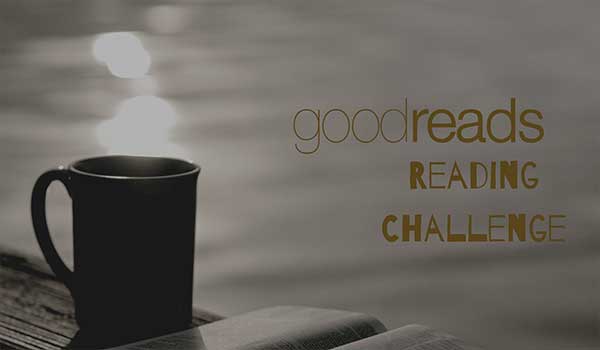
I keep reading some of the ones that are part of the Goodreads Choice Awards. They’re not always all of them, but there might be two worth for us out of ten. I get overwhelmed with the mystery-thriller section because there are so many every time you go second-hand book shopping.
- The first challenge I want to do is finish ten book series.
- The second challenge I want to do is to read more classics.
I look at the winners of the Goodreads Choice Award of 2022 and try to read as many of them as possible throughout the year and the nominees because there are 20 per category. Then I do my own awards show a year later, letting you know which ones I would vote for now that I’ve had time to read some of them. By the time they announce them and then announce the winner. It’s not enough time for you to read any who has time to read all the new releases. There’s a mix of genres too, which I’m happy about.
- Then we had the biggest challenge of 2023: I wrote down all my unread books on my shelves and put them in a jar.
So those are all the big reading challenges I want to do in 2023 from Goodreads.
To add books to your Goodreads reading challenge, follow these steps:
- Log in to your Goodreads account and click “My Books” in the top right-hand corner of the screen.
- Click “Add a book” in the top left-hand corner of the page.
- Type in the title, author, or ISBN of the book you want to add to your reading challenge in the search box and hit “Enter.”
- From the search results, click on the correct edition of the book you want to add to your challenge.
- Select the “Currently Reading,” “Read,” or “Want to Read” option to indicate the status of the book in your reading challenge.
- Set the start and finish dates for the book if you want to track your progress, and add a rating and review if desired.
- Click “Save” to add the book to your reading challenge.
You can repeat this process for each book you want to add to your reading challenge. Goodreads will automatically track your progress and update your reading challenge based on the number of books you have read and your goal.
Summer Reading Challenge 2023
Here’s a list of potential challenges and ideas to help you get started:
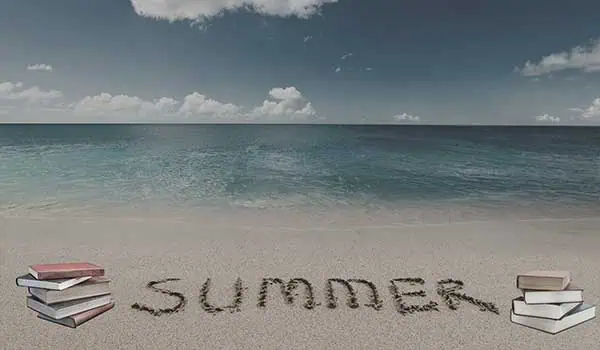
- Set a goal for the number of books you want to read. For example, challenge yourself to read 10, 15, 20, or 30 books over the summer.
- Choose a theme for your reading challenge. For example: Female authors, books about different cultures or countries, or books that have won literary awards.
- Join a book club (BookTok/BookTube) or create your own with friends or family. Choose a book to read each month and discuss it together.
- Participate in a reading challenge hosted by a book blog or website. For example: BookRiot, Goodreads, or the Modern Mrs. Darcy Summer Reading Guide.
- Set a specific reading goal. For example: a classic novel, a book on a topic you’ve always wanted to learn about, or a book by an author you’ve never read before.
- Create a reading list based on a specific genre, such as science fiction, historical fiction, or memoirs.
- Set aside a specific amount of time each day or week to read, such as an hour before bed or half an hour during your lunch break.
Summer book recommendations organized by tropes:
Enemies-to-Lovers:
- The Hating Game by Sally Thorne: A workplace romance between two co-workers.
- The Unhoneymooners by Christina Lauren: A romance between two people who can’t stand each other but are forced to go on a honeymoon together.
- The Simple Wild by K.A. Tucker: A romance between a city girl and an Alaskan bush pilot who don’t get along at first.
Second Chance Romance:
- One Last Stop by Casey McQuiston: a romance between two women who meet on the subway and discover they have a connection from a previous life.
- The Idea of You by Robinne Lee: a romance between a 39-year-old divorced mother and a 20-year-old boy band member.
- The Last Letter from Your Lover by Jojo Moyes: a romance between two people who reconnect after finding letters from a past love affair.
Coming of Age:
- The House in the Cerulean Sea by T.J. Klune: a fantasy novel about a caseworker for magical orphans.
- Ace of Spades by Faridah Àbíké-Íyímídé: a thriller about two students who discover a dangerous secret at their elite private school.
- The Summer of Everything by Julian Winters: a contemporary novel about a young adult who discovers his true passion while working at a bookstore for the summer.
Road Trip:
- The Great Alone by Kristin Hannah: a historical fiction about a family’s journey to start a new life in Alaska.
- Anxious People by Fredrik Backman: a heartwarming story about a group of people who are taken hostage during a bank robbery.
- The Switch by Beth O’Leary: a contemporary novel about a grandmother and granddaughter who swap lives for summer.
Small-Town Romance:
- Beach Read by Emily Henry: a romance between two writers who are forced to confront their pasts.
- The Giver of Stars by Jojo Moyes: a historical fiction novel about a group of women who bring books to people in remote areas of Kentucky.
- The Midnight Library by Matt Haig: a fantasy novel about a woman who gets to explore different versions of her life.
Summer book recommendations organized by genre:
Fiction:
- The Vanishing Half by Brit Bennett.
- Klara and the Sun by Kazuo Ishiguro.
- Leave the World Behind by Rumaan Alam.
- The Push by Ashley Audrain.
- Great Circle by Maggie Shipstead.
- Crying in H Mart by Michelle Zauner.
- All Boys Aren’t Blue by George M. Johnson.
- The Beauty of Living Twice by Sharon Stone.
- Broken by Jenny Lawson.
- Just as I Am.
Young Adult:
- Concrete Rose by Angie Thomas
- Pumpkin by Julie Murphy.
- Iron Widow by Xiran Jay Zhao.
- We Are Inevitable by Gayle Forman.
Non-Fiction:
- Four Hundred Souls.
- The Code Breaker by Walter Isaacson.
- Empire of Pain by Patrick Radden Keefe.
- The Bomber Mafia by Malcolm Gladwell.
- Believing.
Winter Reading Challenge 2023
Winter reading challenges can be a fun way to keep you engaged with reading during the colder months. Here are some ideas for a winter reading challenge based on tropes and genres:

Cozy Mystery Challenge: A cozy mystery challenge can be a great way to mix up your reading list. Choose a set number of cozy mysteries to read throughout the winter months. Look for books with a small-town setting, an amateur sleuth, and a touch of humor.
Winter Romance Challenge: Winter is the perfect time for a romance. Choose a set number of romances to read throughout the season. Look for books with a winter setting, a slow-burn romance, and maybe even a holiday theme.
Snowy Setting Challenge: There’s something magical about a book set in a snowy location during the winter. Select a set number of books with a snowy setting to read throughout the winter months. For example: snow-covered mountains or cozy cabins in the woods.
Time Travel Challenge: A time travel challenge can be fun to mix up your reading list. Choose a set number of books that involve time travel. It can be historical time travel, futuristic time travel, or something in between.
Retelling Challenge: Retellings of classic stories can be a fun way to experience old stories in a new way. Choose a set number of retellings to read throughout the winter months. Check out retellings of classic fairy tales and myths.
Winter Sports Challenge: Winter sports can be a thrilling backdrop for a story. Choose a set number of books with a winter sports theme, such as skiing, snowboarding, or ice skating, as a central theme.
Gothic Novel Challenge: If you enjoy the brooding atmosphere of Gothic literature, a Gothic novel challenge can be a fun way to embrace the darker side of winter. Choose a set number of Gothic novels with a spooky castle, a mysterious stranger, and a touch of the supernatural.
Holiday Story Challenge: Winter is the season of holidays, and plenty of stories exist to match. Choose a set number of books with a holiday theme that celebrates Christmas, Hanukkah, Kwanzaa, or any other winter holiday.
Magical Realism Challenge: Magical realism combines realistic settings with magical or supernatural elements. Select several magical realism books that blur the line between reality and fantasy.
Survival Story Challenge: Winter can be a harsh and unforgiving season, making it the perfect setting for a survival story. Collect a set number of books with a survival theme and struggling to survive in a harsh winter landscape.
These are popular ideas for a winter reading challenge based on tropes and genres. Choose the challenge that speaks to you, and start reading!
Reading Challenge for adults
There are several reasons why adults should follow a reading challenge, including:
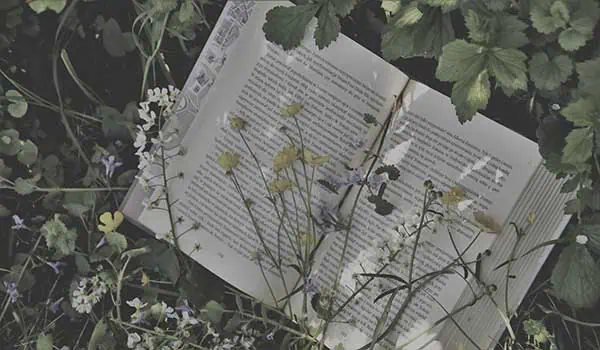
Promotes reading habits: Reading challenges help adults cultivate a habit of reading regularly and also help improve their vocabulary, critical thinking, and overall mental health.
Expand knowledge: Adults can explore new topics and genres they might not have otherwise discovered. It can expand their knowledge and understanding of the world around them.
Enhances creativity: Reading challenges can help stimulate creativity and imagination by exposing adults to different perspectives and ideas.
Reduces stress: Reading is a stress reliever, and participating in a reading challenge can provide a structured way for adults to relax after a long day.
Encourages socialization: Many reading challenges are community-based and involve connecting with other readers, which can be an excellent way for adults to meet new people and make friends with similar interests.
Participating in a reading challenge can provide numerous benefits for adults, from expanding their knowledge and creativity to reducing stress and improving their mental health.
Reading challenges for adults based on tropes and genres:
Mystery/Crime Genre Challenge: Read a mystery or crime novel featuring a detective who is not a police officer in a small town, a twist ending written by a female author, and featuring an amateur detective.
Romance Genre Challenge: Read a romance novel featuring a love triangle set in a foreign country, written by an author of color, with a strong female lead and a slow-burning romance.
Science Fiction/Fantasy Genre Challenge: Read a science fiction or fantasy novel featuring a post-apocalyptic world, a non-human protagonist, and a political message written by a debut author with a magic system.
Historical Fiction Genre Challenge: Read a historical fiction novel set during World War II, featuring a royal family, and multiple narrators, written by an author from a different culture, and set in a time and place you know little about.
Thriller/Suspense Genre Challenge: Read a thriller or suspense novel featuring a serial killer, and a plot twist, written by a male author, set in an exotic location, with a strong female protagonist.
Young Adult Genre Challenge: Read a young adult novel featuring a coming-of-age story set in a boarding school, written by an LGBTQ+ author, in a dystopian setting, and featuring a strong female friendship.
Literary Fiction Genre Challenge: Read a literary fiction novel with an unreliable narrator, set in a small town, written by an author from a different country, with a slow pace and a philosophical message.
Have fun, and choose books that you’re excited to read!
Reading challenges for students
Reading challenges that focus on tropes and genres can be a great way to encourage students (middle school/college) to read more and expand their knowledge.

Here are a few reading challenges that you could consider:
Genre-based challenge: Students have to read a certain number of books from each genre, such as mystery, romance, science fiction, fantasy-horror, historical fiction, etc. It’s a great way to expose students to various genres and encourage them to explore new types of literature.
Trope-based challenge: Students have to read books that contain specific tropes or story elements, such as love triangles, chosen ones, coming-of-age stories, etc. It’s a fun way to get students to think more critically about the stories they are reading and identify common themes and motifs.
Hybrid challenge: This challenge combines both tropes and genres, requiring students to read a certain number of books that fit within specific categories. For example, students must read a mystery novel with a love triangle or a science fiction book with a chosen protagonist.
Diversity challenge: This challenge promotes diversity in literature by requiring students to read books by authors from different cultural backgrounds or featuring diverse characters and perspectives.
Classics challenge: This challenge focuses on reading classic literature, with students challenged to read a certain number of books from different time periods and genres, such as Shakespearean plays, Victorian novels, or American literature classics.
These are a few examples of reading challenges that can be created based on tropes and genres. The key is to make the challenge engaging and fun and to encourage students to explore new types of literature that they might not have otherwise discovered.
Reading Challenge for Kids
Participating in a reading challenge can have many benefits for kids, including:
Improving reading skills: Regular reading helps kids to improve vocabulary, comprehension, and fluency.
Encouraging a love of reading: When children are encouraged to read, it can help develop a lifelong love of reading.
Exposing kids to different genres: Reading challenges encourage them to explore different genres and styles of writing, which can help them discover new interests and thoughts.
Building confidence: As kids read more, they become more confident in reading and understanding complex texts.
Developing critical thinking skills: Reading challenges involve prompts or questions which encourage kids to think critically about what they’re reading and develop critical thinking skills.
Encouraging goal-setting and tracking progress: Kids set and achieve goals and track their progress over time.
Sense of accomplishment: As they complete the challenge and finish more books, they can feel a sense of accomplishment and pride in their achievements.
Overall, participating in a reading challenge can be a fun and engaging way for kids to improve their reading skills, discover new interests, and develop a love of reading.

Here’s a reading challenge for kids by tropes and genre:
Mystery: Read a book where the main character solves a mystery.
Adventure: Read a book where the protagonist goes on a thrilling adventure.
Fantasy: Read a book that takes place in a fantastical world.
Science Fiction: Read a book that takes place in the future or involves science and technology.
Historical Fiction: Read a book set in the past.
Humor: Read a book that makes you laugh out loud.
Realistic Fiction: Read a book that tells a realistic story.
Animal Protagonist: Read a book where the main character is an animal.
Friendship: Read a book about the power of friendship.
Sports: Read a book about a sport or a sports team.
Don’t forget to listen to a full-cast audiobook.
More ideas for kids:
- Set in a different country.
- Won an award.
- Part of a series.
- Published the year your kid was born.
- A biography or autobiography.
- A classic children’s book.
- A topic that interests your kid.
- A book that has been turned into a movie.
- A book with a protagonist who is different from your kid.
- Happy ending.
Kids can choose to read books from different genres and tropes throughout the year and keep track of their progress. They can also share their favorite books with friends and family or join a book club to discuss the books they’ve read.
Check: Books For Children
How do you build your reading challenge?
If you want to create your own reading challenge, here are some steps you can follow:
Determine the purpose of your reading challenge: What do you hope to achieve through this challenge? Do you want to encourage people to read more generally, or do you have a specific goal (diverse authors or exploring a genre)? Having a clear purpose in mind will help guide the rest of your planning.
Choose a timeframe: Decide on the timeframe for your challenge. Will it be a year-long challenge or a shorter timeframe, such as a month or a season? Consider what will work best for your audience and the challenge’s purpose.
Set the criteria: Determine the criteria for the challenge. Will it be based on the number of books reads, or will there be other requirements, such as reading books from specific genres or authors? Make sure the criteria are achievable but still challenging.
Create a tracking system: Consider how participants will track their progress through the challenge. Will you provide a tracking sheet, or must participants keep their records? You may want to create a spreadsheet or a mobile app to make tracking easier.
Provide resources: Consider providing participants with resources to help them complete the challenge, such as reading lists, book recommendations, or discussion forums.
Promote the challenge: Spread the word about your reading challenge through social media, email lists, and other platforms. Encourage participants to share their progress and to connect throughout the challenge.
Consider rewards: While not necessary, you may want to offer rewards for completing the challenge, such as a certificate of completion or a small prize.
Following these steps, you can create a fun and engaging reading challenge that encourages people to read more, explore new genres and authors, and connect with other readers.
What makes the reading challenge special? (Benefits of participating in a reading challenge)
Reading challenges can be special in a number of ways, depending on the specific challenge and the individual participating. Here are some factors that can make a reading challenge special:
Prompts or themes: Many reading challenges have specific prompts or themes to guide readers in their selections. These prompts can be based on different genres, authors, time periods, or other criteria and can help readers discover books they may not have otherwise considered.
Goals and motivation: Participating in a reading challenge can motivate to read more and set reading goals. It can be especially helpful for people who want to read more but have trouble finding the time or motivation.
Community: Many reading challenges have a community aspect, either in person or online. It can create a sense of camaraderie among readers and allow them to share thoughts and insights on the books being read.
Exposure to new literature: Reading challenges can encourage readers to explore new and diverse literature. It can expand readers’ views and introduce them to authors or genres.
Personal growth: Reading challenges can also provide an opportunity for personal growth and inspire them to take action in their own lives.
Overall, the reading challenge depends on the individual participating and their personal goals and interests. However, the above factors are common reasons people may participate in reading challenges.
Reading challenge app
There are several reading challenge apps available that can help you track your reading progress and provide inspiration for your reading journey. Here are a few popular options:
Goodreads App: Goodreads is a free app that tracks the books you’ve read, rate and review books, and connect with other readers. The app also offers reading challenges and personalized book recommendations based on your reading history.
Reading Rewards: Reading Rewards is a kids’ reading log and incentive program. This app allows parents and educators to track children’s reading progress and set reading goals. Kids can earn rewards and badges for completing reading challenges.
Bookly: Bookly is a paid app offering personalized reading plans and challenges. It allows you to set reading goals, track your reading progress, and receive book recommendations.
Reading List: Reading List is a free app that helps you organize and track the books you want to read, are currently reading, or have already read. The app allows you to rate and review books, set reading goals, and track progress.
Litsy: Litsy is a social media app for book lovers. The app allows you to share and discover books, connect with other readers, and participate in reading challenges and book clubs.
Each app offers unique features and benefits, so it’s worth exploring different options.
I hope you find some of these recommendations exciting and enjoyable! Make your challenge achievable and enjoyable, and don’t forget to keep track of your progress along the way.
Grab Reading Challenge Bundle!
Grab the free Reading Challenge Bundle to get started!
- Reading Planner Template, Book Review, Reading Tracker.
- Reading Log, Book Wishlist, Book Planner.
- Reading Challenge Journal.
